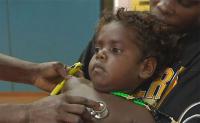Days after Aboriginal leaders found the fresh Australian national budget leaving indigenous affairs “in a trauma zone” comes news that the state government of Western Australia is slashing Aboriginal health funding by half.
The peak body representing 21 Aboriginal Community Controlled Health Services in Western Australia (AHCWA) has described being hit by a double whammy after finding out about a 50 per cent state budget cut to Indigenous programs.
Budget papers show that funding for Aboriginal-run medical services has halved from more than $30 million to less than $16 million.
The council's chair Michelle Nelson-Cox said the cut came as a shock. "We weren't advised that we were potentially at risk of losing some of our core funding."
"We've been penalised through the Commonwealth and now we're penalised through the State Government," she said.
Cuts although a funding review ordered by the government listed 80% of programs as very good or good?
Health Minister Kim Hames’ explanation: “The funding that I have received through the Treasury process only funded those that were listed as very good, which is in effect a halving of the funding available for those programmes."
Hames said the Health Department believed a lot of programs listed as good still provided a quality service, and funding would be found somewhere.
"[The] Department of Health is going through all of our programs, through all of our budgets in all of our regions to find additional funding."
AHCWA states on its website that they “hope that this is not an exercise in robbing Peter to pay Paul.”
“The programs, known as the Footprints to Better Health Strategy, aimed to increase access to quality health care, improve services and create jobs for Aboriginal people in the health sector.
“Michelle Nelson-Cox said the Minister must ensure the top-up funding did not come from core funding provided to Aboriginal Medical Services to provide primary health care.
“While we welcome news that this strategy is likely to be funded, what we are very concerned about is where in the health budget this money is going to come from,” she said.
Ms Nelson-Cox said AHCWA was particularly concerned that the Department might attempt to take funding out of primary health care.
“We will fight any move to shift funding out of core services to top up the Footprints to Better Health strategy,” she said.
“The primary health care funding is needed to employ doctors and nurses in 20 Aboriginal Medical Services around the state.
“That funding is absolutely vital for the health of Aboriginal people and we would oppose any move to reallocate even one dollar of it.”
Western Australia is widely seen as racist Australia’s most racist state.
The “Bulletin” of the World Health Organization noted in 2008 that “the vast disparities between the health of Australia’s indigenous Aboriginals and the rest of the population are disquieting in such an affluent country”.
WGAR Background: Aboriginal Peoples and the impact of the Federal Budget
Other
news just out:
Enforced
management of Aboriginal income has failed
The expensive and extensive government-funded evaluation of income management
in the Northern Territory clearly failed to find it worth ongoing funding.
Yet the 2015-16 budget has not only included a two-year
extension of the services to 25,000 recipients, but signals
more expansion of the basic concept. This makes no sense.
Northern Territory Intervention
opened way to remote homeland closures
Researcher Paddy Gibson sees the
roots of the plan to close remote Aboriginal
communities in the Intervention.
Video of full speech. After 12 months living in Alice Springs Gibson reports on
the effects
of current
government policies on First Nations Peoples communities. Speech.
From
missions to homelands and back to assimilation
The Western Australian government’s statement that Aboriginal people would finally
be "consulted" about forced homelands closures was only a cynical
public relations exercise.
Compelling forum on pressing issues
Speakers included Rosalie Kunoth-Monks, Alison Anderson, Michael Ghillar Anderson, Jeff McMullen, Gerry Georgatos, on culture, identity and ongoing colonial oppression. Full length YouTube coverage available very soon.
Packed Melbourne Resistance Activist Centre hears Indigenous leaders on fighting racism
Speakers including Wendy Brabham, nationally-respected Aboriginal academic and traditional owner from the Wamba Wamba, Wergaia, Nyeri Nyeri and Dhudhuroa first nations and Tarneen Onus-Williams, a Gunditjmara woman and member of the Warriors of Aboriginal Resistance (WAR) outlined some of their philosophies.
Earlier
- How an Australian Aboriginal family turned their sister's death into a youth suicide prevention group
Majority of Australians would vote for Indigenous recognition in a referendum
“Proposed constitutional reforms are treasonous and fraudulent!”
Australian government budget leaves indigenous affairs in a “trauma zone”
Stop the forced closure of Aboriginal communities in Australia -- Call-to-Action day!
French researchers: “Aboriginal communities should not be closed!”
By evicting the homelands, Australia has again declared war on Indigenous people
Aborigines appeal to UN indigenous forum over homelands closure plans
Aboriginal group fights to stop $16bn Carmichael coalmine, Australia’s largest
Upcoming international Perth conference on racist theft of Aboriginal children
Stoppt die Schließung von indigenen Gemeinden in Australien!
'Systemic racism' against Aboriginal communities is savaged at the United Nations
Aborigines stirring for national recognition of their frontier wars dead

